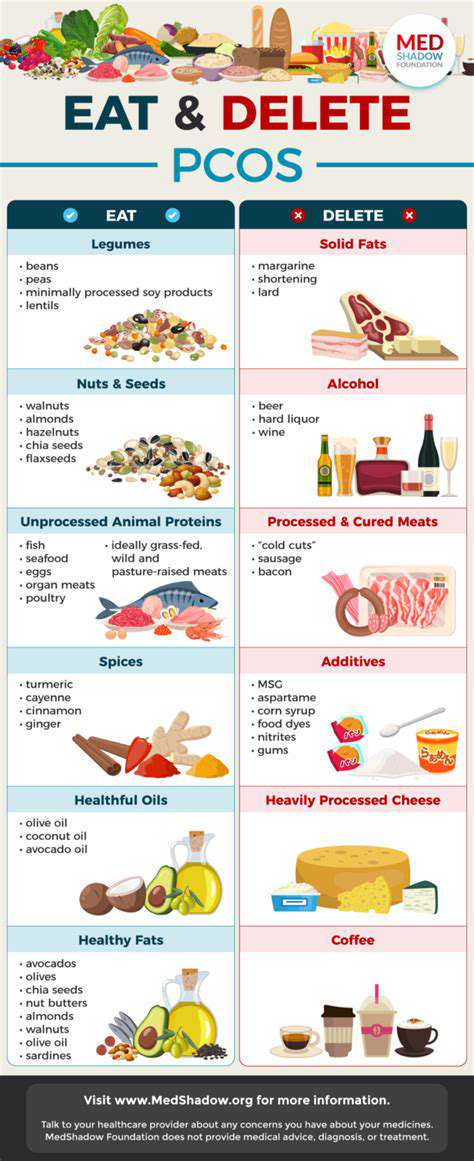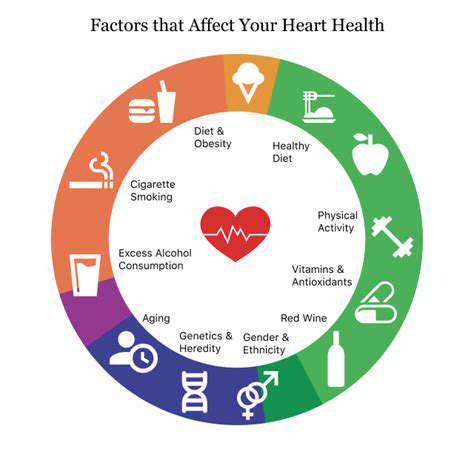Guide to Managing PCOS with Diet
Foods to Include and Exclude in a PCOS Diet

Nutritional Powerhouses
Whole foods should dominate your grocery list. Nature's packaging delivers perfect nutrient combinations that processed foods can't match. Vibrant berries and leafy greens burst with phytochemicals that combat cellular aging, while their fiber content naturally regulates digestion and blood sugar.
Quality proteins like eggs and wild-caught fish provide complete amino acid profiles for tissue repair. Unlike processed deli meats, these clean protein sources contain no questionable additives that might trigger inflammation.
Smart Carb Selection
Whole grains offer more than lasting energy—their fibrous matrix slows glucose absorption. This gradual energy release prevents blood sugar spikes that can worsen insulin resistance—a key concern for PCOS management. Ancient grains like farro and teff offer bonus minerals rarely found in refined flour products.
When baking, try substituting half the white flour with almond meal or oat flour. These alternatives increase protein content while lowering glycemic impact—a simple swap with significant metabolic benefits.
Brain-Boosting Fats
Your brain consists mostly of fat, making dietary fats crucial for cognitive performance. Avocados and walnuts provide monounsaturated fats that support neurotransmitter function. Cold-water fish deliver DHA—an omega-3 that actually builds brain tissue and may reduce depression risks. These fats also help regulate reproductive hormones often imbalanced in PCOS.
For cooking, opt for stable fats like coconut oil or ghee at high temperatures. Their saturated fat content resists oxidation better than vegetable oils, preventing harmful free radical formation.
The Hydration Factor
Water facilitates countless biochemical reactions most people never consider. Even mild dehydration reduces concentration and physical performance substantially. Beyond drinking, consume water-rich foods like cucumbers and watermelon—their cellular water contains beneficial electrolytes for optimal hydration.
Herbal teas count toward fluid intake while providing therapeutic plant compounds. Peppermint soothes digestion, while hibiscus offers natural blood pressure support—making hydration both functional and flavorful.
Dietary Red Flags
Processed foods often contain inflammatory oils, excess sodium, and hidden sugars that disrupt metabolic health. These engineered foods trick your brain's reward system, encouraging overconsumption while providing minimal nutrition. Breaking free from processed food dependence requires conscious replacement with satisfying whole food alternatives.
Sugary beverages deliver liquid calories that bypass normal satiety signals. Switching to infused waters or herbal teas eliminates this stealthy calorie source while providing hydration benefits.
Conscious Consumption
Portion awareness prevents accidental overeating, especially with calorie-dense foods. Using smaller plates creates visual satisfaction with less food, while chewing thoroughly enhances nutrient absorption. Eating without distractions allows you to recognize true hunger and fullness cues that screens often override.
Try the half-plate rule—reserving 50% of your plate for non-starchy vegetables automatically balances meals. This simple guideline ensures micronutrient diversity while naturally controlling portions of higher-calorie items.
Dietary Diversity Matters
Rotating food choices provides broader nutritional coverage than eating the healthiest foods repeatedly. Each fruit, vegetable, or grain offers unique phytonutrients that cumulatively enhance wellbeing. Seasonal eating naturally creates this rotation while ensuring peak freshness and flavor.
Experiment with one new whole food weekly—perhaps purple cauliflower or black rice. This practice expands your nutrient intake while keeping meals interesting and enjoyable.
Read more about Guide to Managing PCOS with Diet
Hot Recommendations
- Traditional Foods for Day of the Dead
- Food Etiquette in Italy: Pasta Rules!
- Best Family Friendly Restaurants with Play Areas in [City]
- Review: The Best [Specific Dessert] Place in [City]
- Top Ice Cream Parlors in [City]
- Traditional Foods for Halloween
- The History of the Potato in Ireland
- Best Vegan Pizza Joints in [City] [2025]
- Best Bakeries for Sourdough Bread in [City]
- Food Culture in Argentina: Asado and Wine

![Healthy Eating for Toddlers [Tips & Recipes]](/static/images/28/2025-05/FruitandVeggieFun.jpg)








![Review: The [Specific Brand] Sous Vide Cooker](/static/images/28/2025-06/ValueforMoney3AIsitaWorthyInvestment3F.jpg)
